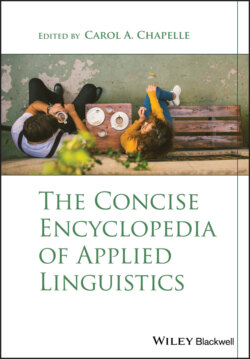Читать книгу The Concise Encyclopedia of Applied Linguistics - Carol A. Chapelle - Страница 35
References
Оглавление1 Alexander, N. (1997). Language policy and planning in the new South Africa. African Sociological Review, 1(1), 82–98.
2 Balfour, R. J. (1999). Naming the father: Re‐examining the role of English as a medium of instruction in South African education. Changing English, 6(1), 103–13.
3 Bamgbose, A. (2001). Language policy in Nigeria: Challenges, opportunities and constraints. Keynote address at the Nigerian Millennium Sociolinguistics Conference, University of Lagos, Nigeria, August 16–18.
4 Bamgbose, A. (2006). Multilingualism and exclusion: Policy, practice and prospects. Keynote address at the Symposium on Multilingualism and Exclusion. University of the Free State, Bloemfontein, South Africa, April 24–6.
5 Cultural Survival. (2001, June). Asmara Declaration on African Languages and Literatures. Retrieved March 25, 2019 from https://www.culturalsurvival.org/publications/cultural-survival-quarterly/asmara-declaration-african-languages-and-literatures
6 Djité, P. G. (2008). The sociolinguistics of development in Africa. Clevedon, England: Multilingual Matters.
7 Fardon, R., & Furniss, G. (Eds.). (1994). African languages, development and the state. New York, NY: Routledge.
8 Fishman, J. A. (1996). Introduction: Some empirical and theoretical issues. In J. Fishman, A. Conrad, & A. Rubal‐Lopez (Eds.), Post‐imperial English: Status change in former British and American colonies, 1940–1990 (pp. 3–12). New York, NY: Mouton.
9 Kamwangamalu, N. M. (1997). Multilingualism and education policy in post‐apartheid South Africa. Language Problems and Language Planning, 21(3), 234–53.
10 Kamwangamalu, N. M. (2004). Language policy/language economics interface and mother tongue education in post‐apartheid South Africa. Language Problems and Language Planning, 28(2), 131–46.
11 Kamwangamalu, N. M. (2016). Language policy and economics: The language question in Africa. London, England: Palgrave Macmillan.
12 Kwesiga, J. B. (1994). Literacy and the language question: Brief experiences from Uganda. Language and Education: An International Journal, 8(1&2), 57–63.
13 Laitin, D., & Ramachandran, R. (2016). Language policy and human development. American Political Science Review, 110(3), 457–80.
14 Le Page, R. B. (1997). Political and economic aspects of vernacular literacy. In A. Tabouret‐Keller, R. Le Page, P. Gardner‐Chloros, & G. Varro (Eds.), Vernacular literacy: A re‐evaluation (pp. 23–81). Oxford, England: Clarendon.
15 London, N. (2003). Ideology and politics in English language education in Trinidad and Tobago: The colonial experience and a postcolonial critique. Comparative Education Review, 47(3), 287–320.
16 McArthur, T. (1983). A foundation course for language teachers. Cambridge, England: Cambridge University Press.
17 Mfum‐Mensah, O. (2005). The impact of colonial and postcolonial Ghanaian language policies on vernacular use in schools in two northern Ghanaian communities. Comparative Education, 41(1), 71–85.
18 Nettle, D., & Romaine, S. (2000). Vanishing voices: The extinction of the world's languages. Oxford, England: Oxford University Press.
19 Ngugi wa Thiong'o. (1983). Decolonizing the mind: The politics of language in African literature. London, England: James Curry.
20 OAU. (1986). Language plan of action for Africa. Council of Ministers, Forty‐fourth Ordinary Session, Addis Ababa, Ethiopia, July.
21 Paulston, C. B. (Ed.). (1988). International handbook of bilingualism and bilingual education. New York, NY: Greenwood.
22 Popham, P. (1996, January 20). The day a language died. Independent, pp. 39, 43.
23 Prah, K. (1995). African languages for the mass education of Africans. Bonn, Germany: German Foundation for International Development, Education, Science and Documentation Center.
24 Republic of South Africa. (1996). Constitution of the Republic of South Africa. Pretoria, South Africa: Government Printer.
25 Spencer, J. (1985). Language and development in Africa: The unequal equation. In N. Wolfson & J. Manes (Eds.), Language of inequality (pp. 387–97). The Hague, Netherlands: Mouton.
26 Tollefson, J. W. (2002). Language rights and the destruction of Yugoslavia. In J. W. Tollefson (Ed.), Language policies in education: Critical issues (pp. 179–99). Mahwah, NJ: Erlbaum.
27 UNESCO. (1995). The use of the vernacular in education. Paris, France: UNESCO.
28 UNESCO. (2003). Education in a multilingual world. UNESCO Education Position Paper. Paris: UNESCO. Retrieved March 25, 2019 from https://unesdoc.unesco.org/ark:/48223/pf0000129728
29 UNESCO. (2013). Adult and youth literacy: National, regional and global trends, 1985–2015. UIS Information Paper, June. Retrieved March 25, 2019 from http://uis.unesco.org/sites/default/files/documents/adult-and-youth-literacy-national-regional-and-global-trends-1985-2015-en_0.pdf
30 UNESCO. (2014). Adult and youth literacy. UIS Fact Sheet, 29, September. Retrieved March 25, 2019 from http://uis.unesco.org/sites/default/files/documents/fs29-adult-youth-literacy-2014-en_1.pdf
31 Weinstein, B. (Ed.). (1990). Language policy and political development. Norwood, NJ: Ablex.
